English
- Afrikaans
- Albanian
- Amharic
- Arabic
- Armenian
- Azerbaijani
- Basque
- Belarusian
- Bengali
- Bosnian
- Bulgarian
- Catalan
- Cebuano
- Corsican
- Croatian
- Czech
- Danish
- Dutch
- English
- Esperanto
- Estonian
- Finnish
- French
- Frisian
- Galician
- Georgian
- German
- Greek
- Gujarati
- Haitian Creole
- hausa
- hawaiian
- Hebrew
- Hindi
- Miao
- Hungarian
- Icelandic
- igbo
- Indonesian
- irish
- Italian
- Japanese
- Javanese
- Kannada
- kazakh
- Khmer
- Rwandese
- Korean
- Kurdish
- Kyrgyz
- Lao
- Latin
- Latvian
- Lithuanian
- Luxembourgish
- Macedonian
- Malgashi
- Malay
- Malayalam
- Maltese
- Maori
- Marathi
- Mongolian
- Myanmar
- Nepali
- Norwegian
- Norwegian
- Occitan
- Pashto
- Persian
- Polish
- Portuguese
- Punjabi
- Romanian
- Russian
- Samoan
- Scottish Gaelic
- Serbian
- Sesotho
- Shona
- Sindhi
- Sinhala
- Slovak
- Slovenian
- Somali
- Spanish
- Sundanese
- Swahili
- Swedish
- Tagalog
- Tajik
- Tamil
- Tatar
- Telugu
- Thai
- Turkish
- Turkmen
- Ukrainian
- Urdu
- Uighur
- Uzbek
- Vietnamese
- Welsh
- Bantu
- Yiddish
- Yoruba
- Zulu
Telephone: +86 13120555503
Email: frank@cypump.com
Nov . 30, 2024 13:16 Back to list
How to Choose the Right Sewage Ejector Pump for Your Basement Needs
Understanding Basement Sewer Ejector Pumps An Essential Guide
When it comes to maintaining a functional and comfortable home, plumbing is one of the essential systems that require attention. In many basements, especially those that are below the municipal sewer line, a sewer ejector pump is a vital component that ensures waste removal and the effective management of wastewater. This article will explore what a basement sewer ejector pump is, how it works, and why it’s essential for your home.
What is a Basement Sewer Ejector Pump?
A basement sewer ejector pump is a special type of pump designed to move wastewater and sewage from a lower elevation—like a basement—to the municipal sewage system. When plumbing fixtures, such as toilets or sinks, are installed in a basement that is below the level of the main sewer line, a standard gravity system will not work effectively. Instead, an ejector pump is needed to lift the waste up to a level where it can flow into the sewer system.
How Does It Work?
The operation of a sewer ejector pump is relatively straightforward. When wastewater enters the ejector pit (a sealed basin where the pump is located), it triggers the pump to start. The pump is equipped with a motor that pushes the waste through the discharge pipe and upwards toward the sewer line. The pump continues to operate until the water level in the pit drops to a designated level, at which point it shuts off to save energy.
Most sewer ejector pumps consist of a submersible design, which means that the entire unit is submerged in the ejector basin. This design minimizes noise and effectively manages odors associated with wastewater. The pit is also vented to allow for the removal of gases like methane, which can accumulate during the decomposition of waste.
Why is a Basement Sewer Ejector Pump Necessary?
There are several reasons a basement sewer ejector pump is necessary, particularly in homes with below-grade plumbing. Here are a few
2. Maintaining Sanitation Since basements often serve multiple functions—laundry rooms, bathrooms, or additional living space—having an ejector pump helps ensure that waste is disposed of properly, maintaining a sanitary environment.
basement sewer ejector pump

3. Avoiding Flooding Heavy rains or sewage system overloads can result in flooding. The ejector pump helps in managing excess water, reducing the risk of basement flooding.
4. Enhancing Home Value Homes that have efficient sewage systems, including ejector pumps, tend to hold greater value. Prospective buyers are more likely to invest in properties where plumbing issues have been addressed.
Maintenance Tips
To ensure that your sewer ejector pump functions efficiently, regular maintenance is crucial. Here are a few tips
- Inspect the Pump Regularly Check for any visible signs of wear or damage, including strange noises during operation.
- Clean the Ejector Pit Keeping the pit clean and free of debris will help avoid clogs and extend the life of the pump.
- Test the System Regularly run water through the system to confirm that the pump activates and works properly.
- Consider Professional Help When in doubt, or if you notice any issues, consult with a licensed plumber who can inspect and maintain your system.
Conclusion
A basement sewer ejector pump plays a crucial role in home plumbing, particularly for homes with lower-level plumbing fixtures. Understanding how it works and its importance can help homeowners appreciate its significance in maintaining a safe and functional living environment. Regular maintenance is key to ensuring its longevity and effectiveness, safeguarding both the home and its occupants from potential plumbing issues.
-
ISG Series Vertical Pipeline Pump|High Efficiency&Low Noise
NewsJul.29,2025
-
ISG Series Vertical Pipeline Pump - Chi Yuan Pumps Co., LTD.|High Efficiency, Energy Conservation, Low Noise
NewsJul.29,2025
-
ISG Series Vertical Pipeline Pump-Chi Yuan Pumps Co., LTD.|High Efficiency&Energy-Saving
NewsJul.29,2025
-
ISG Series Vertical Pipeline Pump - Chi Yuan Pumps Co., LTD. | High Efficiency, Energy-Saving
NewsJul.29,2025
-
ISG Series Pipeline Pump - Chi Yuan Pumps | High Efficiency, Low Noise
NewsJul.29,2025
-
High-Efficiency Vertical Slurry Pumps for Mining & Industry Solutions
NewsJul.29,2025










